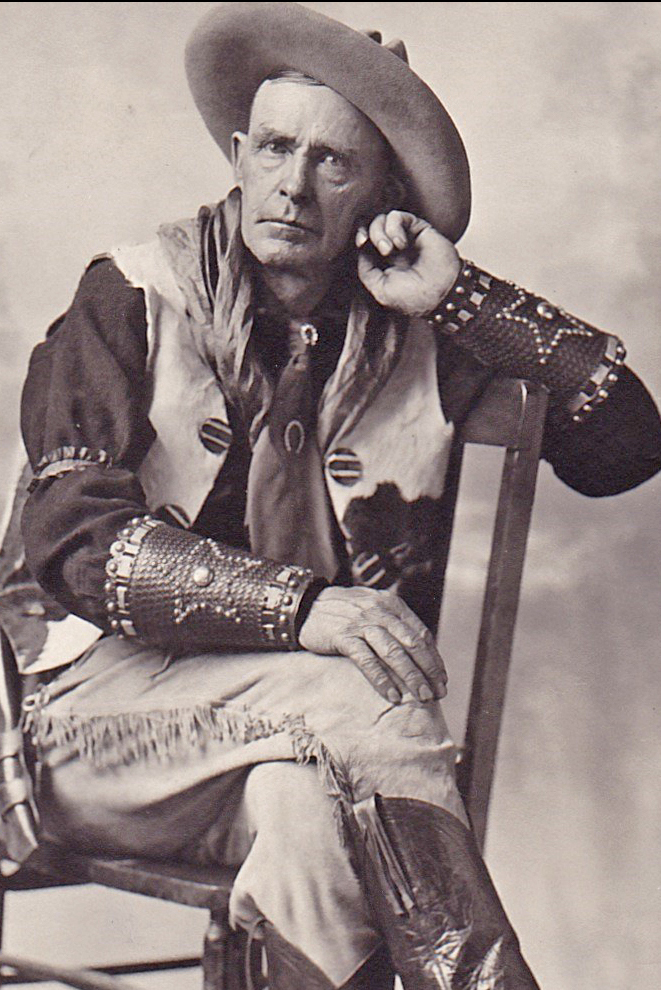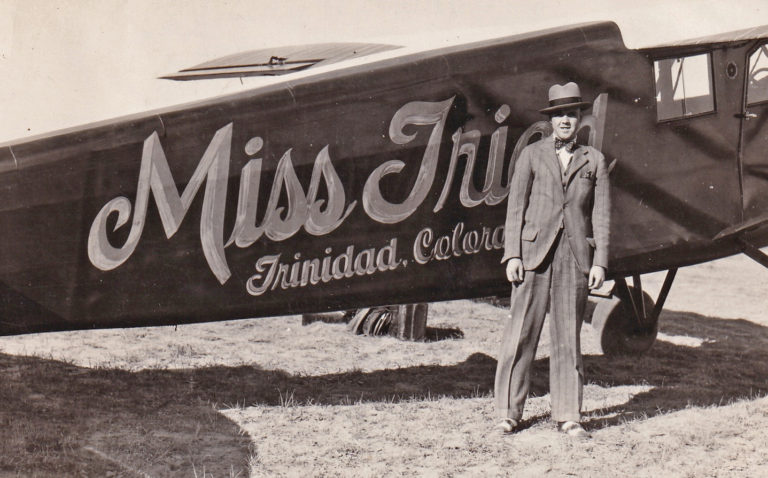The grave marker for John C. Mulcahy at the Prescott National Cemetery in Arizona is typical of military cemetery markers. It’s a rectangular white stone slab set flat on the ground, flush with the grass. It speaks briefly to four facts, one fact to a line: JOHN C. MULCAHY/NEW YORK/ PVT. 8 U. S. CAV/SEPTEMBER 9, 1938. I can picture myself coming across this marker, interested in the fact that this person served in the 8th U.S. Calvary, but unstirred by the rest of it. Researching John Mulcahy was a familiar lesson for me about the uniqueness residing in each of us.
John “Jack” Curran Mulcahy was born in New York City on December 13, 1867, to Patrick and Margaret (Curran) Mulcahy, both Irish immigrants. According to one account, he was orphaned at age five and put into the care of a neglectful and abusive relative. He reportedly ran away to Chicago and was on his own there at age 10. Around the age of 16 or 17 he went west with a wagon train.
By 1898, Jack Mulcahy was residing in Trinidad, Colorado, where he may have been a cowhand. It’s safe to say he was drunk a good part of the time. According to news accounts in the Trinidad Chronicle-News and the Arizona Daily Star, it was in that year that “Jack was ‘dug up’ out of the gutter of Trinidad outside the … Miners Home Saloon by the poet-scout, Captain Jack Crawford.” Mulcahy said he “felt a kindly hand on my shoulder, and a voice said to me, ‘Look, up, Jack’….Then I saw the steady steel-gray eyes of Jack Crawford. He gave me a talk I’ll never forget… and today you couldn’t hire me for $500 to let liquor pass my lips.” With those words from Jack Crawford and the help of the Salvation Army, Mulcahy “ceased to be a drunken cowhand and became the first Colorado cowboy preacher.” Mulcahy called Trinidad his home, perhaps because it was his place of birth into sobriety and a Christian faith.
[Captain Jack Crawford was a prolific poet and writer of short stories, a playwright and actor, and a public speaker on the subjects of temperance and reform. In 1876 he joined “Buffalo Bill” Cody’s theater group, playing “Captain Jack” opposite “Buffalo Bill” in western melodramas. Here is a link to more information about Crawford:
https://centerofthewest.org/2018/08/31/points-west-poet-scout-captain-jack-crawford/ .
November of 1899 found Mulcahy living in Pennsylvania, and it was in that month that he joined the U.S. Army, serving as a private with the 8th U.S. Calvary, Troop M, until honorably discharged in November of 1902. Two months later, he married Rose Elizabeth Harkins in Marshall, Kansas, and they settled down in Wheaton, Kansas. Their union produced at least seven children.
Mulcahy claimed that, in each of the years following his transformation in Trinidad, he preached 365 sermons – if he missed a day, he would give two sermons the next day. He traveled throughout a good part of the West, from town to town, and town to prairie, preaching in a variety of venues, whether it was a street corner, a rodeo, or a park. The Trinidad Chronicle-News stated that “Broncho Jack (was)… known to most of the old cowmen and miners from the Panhandle of Texas to the Miller and Lux outfit (headquartered) at Los Banos, California.’ [In the latter part of the 19th century, Henry Miller and Charles Lux were the largest producers of cattle in California and owners of one of the largest land holdings – i.e., 1,400,000 acres — in the United States.] “Broncho Jack” said he never received a dollar in salary from any church and only took voluntary offerings from those who felt they had benefited from his efforts.
In addition to “Broncho Jack,” Mulcahy also preached under the monikers “Trooper Jack,” “Cowboy Jack” and “Sky Pilot of the Range Country.” He reportedly composed over 100 cowboy songs, poems and recitations. I was able to find a poem of his in an article written by Howard Hickson. The poem is titled “Death of Cherokee Charlie Sned at Elko Nev. (1897).” Here’s a link to that article, which includes a picture of Jack and some biographical information: https://www.gbcnv.edu/hickson/Poet.html .
Mulcahy entertained. A newspaper account from November 1910 reported that he danced a jig at a Catholic fair in Wheaton, Kansas, raising about five dollars. On June 13, 1910, prior to the curtain-raising for a motion picture that was to be presented by H.M. Pomeroy in Wheaton, Jack put on “a sword-swinging specialty…which received a hearty applause.”
“Broncho Jack” preached what he called “Practical Christianity.” Here are some quotes of his that would seem to support that concept:
“There are a lot of folks that couldn’t be hog-tied and dragged to a church…so we should follow the example of Christ and take religion to them.”
“There is no preaching salvation to a man on a hungry stomach.”
“I don’t go on ceremony. I take the Bible just as she reads and tell it to the world on the streets.”
Upon arriving in Tucson, Arizona, in February of 1926, he said “I will ride human herd during the rodeo, and I promise to rope, hog-tie, bull-dog and scratch the devil every evening at 7:15 in front of the old Windsor hotel, at the corner of Church and Congress streets.”
In the fall of 1921, Mulcahy was living on East C. Street in Pueblo, Colorado, to help the hundreds of people victimized by the great flood which overtook Pueblo and vicinity in June of that year, causing much destruction and death. In a letter to the Salina (Kansas) Daily Union newspaper, he appealed to the people of Salina “to box or bundle up all (your) old cast-off clothes…and send them to me, and I will see they are distributed free to the worthy poor and victims of the great Pueblo flood.”
It’s probably safe to say that Jack Mulcahy didn’t make a lot of money off donations. Being a husband and father, he had to support his family, and seemed to be no stranger to work. For a number of years he lived in northeastern Kansas, in the towns of Wheaton and Lillis. He was well known in the area and well-regarded as a house (and church and barn) painter, a sign painter, a hanger of wallpaper and an interior decorator. In that neck of the woods he was called “Mull.”
It’s a puzzle as to how Mulcahy was able to meet his spiritual commitments on the road at the rate of a sermon a day and also meet his work and family obligations at home.
In May of 1938, Jack fell ill while living in Orange County, California, where he was working as a laborer at a shipyard, and journeyed to the Veterans Hospital in Whipple, Arizona. He had been there for over three months and was believed to be improving, when he suddenly took a turn for the worse and died on September 9, 1938, at age 71.
REFERENCES:
- Commonwealth of Pennsylvania, Veteran’s Compensation Application dated March 19, 1934 (www.ancestry.com)
- Arganbright/Reagan and Bly Family Tree (www.ancestry.com)
- Arizona Daily Star (Tucson) February 18, 1926 (www.newspapers.com)
- Arizona Republic, December 3, 1924 (www.newspapers.com)
- The Blue Rapids Times (Blue Rapids, KS), January 22, 1903 (www.newspaperscom)
- The Exponent (Wamego, Kansas), December 9, 1904, and December 23, 1904 (www.newspapers.com)
- The Frankfort Index, August 2, 1923, and September 12, 1938 (www.newspapers.com)
- The Franklin Daily Index, September 12, 1938 (www.newspapers.com)
- The Marysville Advocate, January 10, 1918 (www.newspaperscom)
- “This Month in Climate History: June 3, 1921 Colorado Flooding,” National Centers for Environmental Information, NOAA (at https://www.ncdc.noaa.gov/news/month-climate-history-june-3-1921-colorado-flooding )
- “Poem of Murder, Elko, Nevada – 1896,” Howard Hickson’s Histories at https://www.gbcnv.edu/hickson/Poet.html
- Prescott Evening Courier dated September 11, 1928, on Google News at
- Press-Courier (Oxnard, CA) October 7, 1922 (www.newspapers.com)
- The Salina Daily Union, May 4, 1918, and September 30, 1921 (www.newspapers.com)
- Santa Ana Register, January 27, 1933, and February 4, 1922(www.newspapers.com)
- Westmoreland (Kansas) Recorder, June 16, 1910, August 11, 1910, November 17, 1910, and February 23, 1911 (www.newspapers.com)
- Wikipedia at https://en.wikipedia.org/wiki/Henry_Miller_(rancher)


